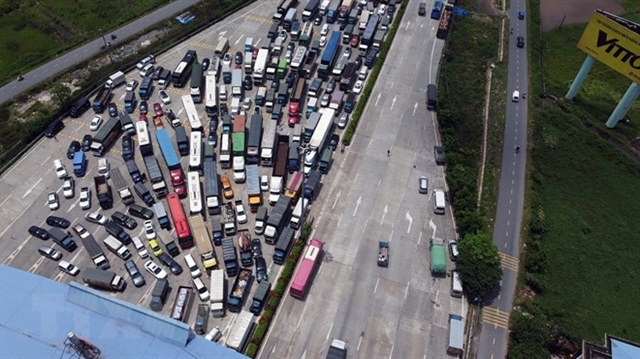 Society
Society


|
| Hundreds of vehicles are stuck at Pháp Vân-Cầu Giẽ toll station in the first day Hà Nội implemented the Government's Directive No 16 last Saturday. — VNA/VNS Photo Huy Hùng |
HCM CITY — Farmers are unable to sell their produce while consumers are struggling to buy food in the southern provinces, in a frustrating paradox created by COVID-19 travel restrictions and the closures of both wholesale and retail markets as a result.
Nguyễn Thị Ánh Lan, president of Tương Lai Aquaculture Co-operative, based in Củ Chi District, HCM City said the co-operative could not find buyers for more than 70 tonnes of perch and snake-head fish after the city applied travel restrictions and the closures of most wholesale and retail markets.
Lan sent a letter to the city’s Agriculture and Rural Development Department to ask for their support and was connected with several buyers to whom she was able to sell 10 tonnes of fish.
However, this still left 60 tonnes of fish that could not be sold, causing a headache for the co-operative, she told the Tiền Phong (Vanguard) newspapers.
Hoàng Văn Cần, in Đồng Nai Province, said his farm still had more than 120 tonnes of fish that he did not know what to do with.
A representative of Nhân Tâm Agricultural Service Co-operative, based in Bà Rịa-Vũng Tàu Province said there were 15 households growing longan, covering a total area of 21ha in the co-operative but at present, there was only one supermarket in HCM City buying longan.
They have been taking 500 kilos to 1 tonne per day at a price of VNĐ40,000 (US$1.7) per kilo, he said, however, there were up to more than 10 tonnes of longan ripening daily.
"We do not know what to do with all of this fruit," he said.
Solutions
Lan said before the pandemic, her co-operative often sold fish to people in Hiệp Thành Ward, District 12, HCM City. She has suggested that the authorities allow a ward representative to collect orders of fish from local people and facilitate the delivery of said fish, she said.
This would not only help to “rescue” the fish but it would also help local people to easily buy the fish, she said.
Trần Lâm Sinh, deputy director of Đồng Nai Province’s Agriculture and Rural Development Department said the department had set up a COVID-19 Support Team to help local farmers sell their produce.
The department had worked with HCM City and other localities to resume the market for farm produce.
However, the transportation of goods, especially farm produce, to many localities has faced many shortcomings, he said.
Hà Nội is an example.
After Hà Nội applied tougher social distancing measures last Saturday Hà Nội’s Transport Department, until Monday, only gave the green light for about 3,000 vehicles, accounting for 10 per cent of the number of vehicles.
Vehicles that transport essential goods for social security, production and export, as well as medical equipment, supplies and biological products to help alleviate the pandemic can apply for green cards.
A representative of Hà Nội’s Transport Department said that 7,000 vehicles were rejected due to incomplete information.
The department had processed the registration of 20,000 vehicles.
However, the process was slower than expected because the system, which sent the data of registered vehicles from the Directorate for Roads of Việt Nam to the department, was overloaded, he said.
The directorate was in the process of fixing the problem, he added.
The Ministry of Agriculture and Rural Development held a press conference on Monday to release information about the production and supply of farm produce in 19 cities and provinces in the southern region.
The ministry said that it was imperative to connect farmers with buyers to consume the farm produce as soon as possible after the ministry heard that a large quantity of fruit and poultry were ready for harvest and consumption.
The ministry has ordered localities to update a list of businesses or units that could consume, or find buyers for, farm produce in the southern localities.
It also asked relevant localities to support transport delivery drivers to quickly test for COVID-19 as well as make it easier for drivers and traders to go to villages and communes to buy farm produce. — VNS




